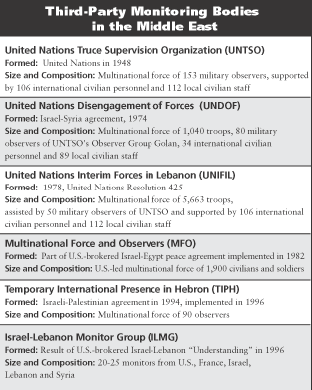International Monitors
In response to the "al-Aqsa intifada," many individuals and some foreign leaders have suggested creating a monitoring force to quell the Israeli-Palestinian conflict. The following is an overview.
The track record of monitoring or observer bodies in the Middle East has been far from successful, having done little to end the region’s violence and often causing harm to Israel’s international standing. When these groups have made even a minor contribution to the easing of tensions, they were introduced in the region with the approval of both the Israeli and Arab sides and used to cement a peace agreement or true cease-fire.
With the Palestinians continuing to violate the U.S.-brokered cease-fire agreement with a steady stream of attacks on Israelis, the current situation does not lend itself to successful third-party monitoring mechanism.
Without a true cease-fire, monitors can’t curb violence
The Temporary International Presence in Hebron (TIPH), a group of unarmed observers in Hebron first agreed to by Israel and the Palestinians in 1994 and first dispatched in 1996, has been unable to fulfill its mandate. In the absence of a working cease-fire with the Palestinians, Hebron has remained the scene of intense violence, with the most egregious recent attack being the murder of an Israeli baby by a Palestinian sniper.
The U.N. Interim Forces in Lebanon (UNIFIL), which has been stationed between Israel and Lebanon since 1978, has failed to curb violence. Furthermore, it has caused real damage to Israel’s relations with several countries with UNIFIL contingents.
Despite the force’s presence, PLO terrorists operating from southern Lebanon routinely carried out terrorist operations in northern Israel until 1982. Subsequently, UNIFIL failed to prevent Hezbollah from bombarding the residents of northern Israel with Katyusha rockets during Israel’s 20-year presence in its Southern Lebanon security zone.
“Hezbollah would launch artillery attacks 50 meters away from a UNIFIL outpost, Israel would shoot back, and UNIFIL would protest against the Israeli response,” Dore Gold, an advisor to Prime Minister Ariel Sharon, recently observed. Even worse, in several cases UNIFIL observers were killed or injured in the IDF’s return fire against the Hezbollah attackers.
Even since Israel’s U.N.-certified withdrawal from Lebanon last year, UNIFIL has made no effort to thwart attacks against Israelis by Hezbollah terrorists, including the abduction of three IDF soldiers. The group’s impartiality also has been called into question since allegations have surfaced concerning the possible bribery of UNIFIL personnel facilitating the kidnapping.
Peace accords, not monitors, can effectively guarantee calm

Two observer forces that have had limited success are the Multinational Force and Observers (MFO) and the U.N. Disengagement Observer Force (UNDOF), which were established following a peace accord and a disengagement treaty, respectively. The MFO is a U.S.-led force established in the Sinai following Israel’s withdrawal and signing of a peace treaty with Egypt. UNDOF is an observer force charged with overseeing the 1974 disengagement between Syrian and Israeli forces.
These agreements were signed by states that, unlike the fractious Palestinian Authority, are sovereign nations accountable for their actions The quiet along the borders with Egypt and Syria has followed a final peace accord and genuine truce, and can largely be attributed to the two sides’ desire to keep things calm, not to the presence of outside monitors.
Two other monitoring mechanisms, the Israel-Lebanon Monitor Group (ILMG) and the U.N. Truce Supervision Organization (UNTSO), have been decidedly ineffectual as their mandates have gone unfulfilled or become outdated. ILMG has not prevented rocket attacks and other cross-border raids on Israel by Hezbollah , while UNTSO is “often forgotten about, as they are in charge of monitoring the no-longer respected lines of the 1949 truce” between Israel and its neighbors, Agence France Presse reports.
Outside observers historically have done little to curb violence, especially in cases without peace agreements or genuine cease-fires, and therefore appear unlikely to do so if placed between Israel and the Palestinians. Also, Israel is reluctant to bring into the conflict outside parties, especially from countries critical of her in the past.
Near East Report

